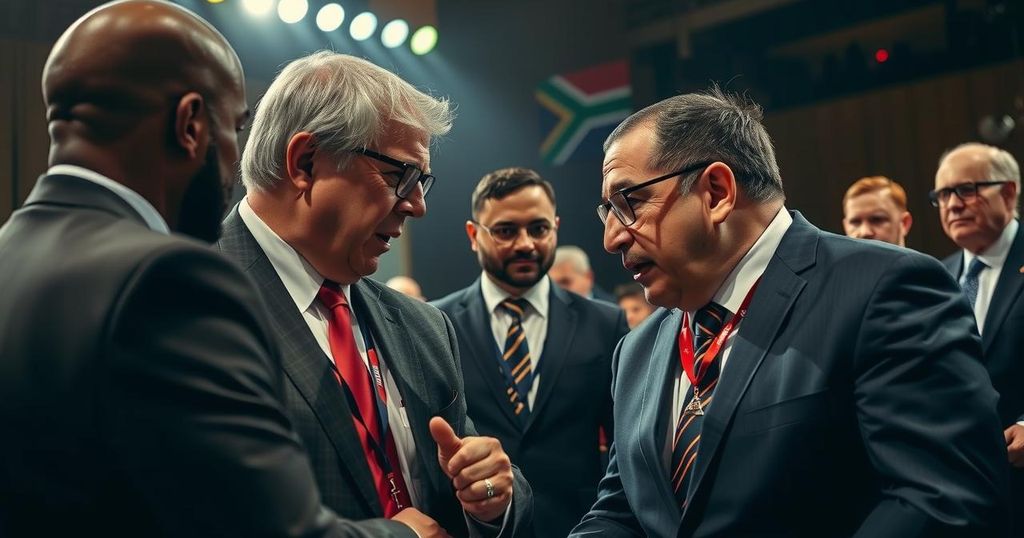IOC President Thomas Bach’s Visit to South Africa: Fostering Olympic Values and Unity
Thomas Bach, President of the IOC, visited South Africa, engaging with SASCOC officials and athletes on key themes such as athlete welfare, Olympic developments, and the upcoming Paris 2024 Olympics. Bach commended SASCOC on their progress and discussed future Olympic prospects in Africa.
Recently, Thomas Bach, the President of the International Olympic Committee (IOC), commenced the second leg of his African tour with a visit to Johannesburg, South Africa. Upon his arrival, he received a warm welcome from Barry Hendricks, President of the South African Sports Confederation and Olympic Committee (SASCOC), IOC Honorary Member Sam Ramsamy, and IOC Member Anant Singh, who accompanied him throughout his visit alongside Mustapha Berraf, IOC Member and President of the Association of National Olympic Committees of Africa (ANOCA). During his time at the SASCOC headquarters, President Bach engaged in the “Indaba,” a meaningful gathering of South African athletes, where he participated in discussions regarding the implications and lessons learned from the upcoming Olympic Games in Paris 2024. A notable feature of this gathering was an extensive hour-long question and answer session, wherein President Bach addressed pivotal issues such as athlete safeguarding, gender equality, and the feasibility of hosting future Olympic Games in Africa. Furthermore, he convened with the SASCOC Board members, national federation presidents, and secretaries general, extending his congratulations on the impressive achievements of the South African team at the Paris 2024 Olympics. Expressing his contentment with SASCOC’s recent progress, President Bach remarked on the organization’s current stability, stating he was “very satisfied to see SASCOC in ‘calm waters’ while simultaneously making dynamic advancements,” underlining the strong rapport between SASCOC and its athletes, as well as the promotion of Olympic values. In an evening dinner attended by members of the SASCOC Board and Gayton McKenzie, the South African Minister for Sports, Arts, and Culture, the Minister spoke passionately about the unifying power of sports in South Africa and highlighted the role of the Olympic Games Paris 2024 in fostering global unity. Additionally, he expressed unwavering support for the forthcoming Youth Olympic Games slated for Dakar in 2026, pledging that South Africa would do everything in its power to ensure their success for the African continent. The following morning, President Bach held a fruitful meeting with Minister McKenzie, discussing the remarkable performance of the South African athletes at the Paris Games and the positive transformations within the National Olympic Committee (NOC). During a phone discussion with South African President Cyril Ramaphosa, they deliberated on the geopolitical climate and its implications on global sports. In addition to his official meetings, President Bach met with Phumzile Mlambo-Ngcuka, the Chair of the IOC’s Advisory Committee on Human Rights. He also visited Soweto, including a significant trip to the home of Nelson Mandela, and toured the Nelson Mandela Foundation, which houses extensive archives dedicated to the legacy of the renowned former South African President and Nobel Peace Prize laureate.
The role of the International Olympic Committee (IOC) is to promote the Olympic values and ensure the successful organization of the Olympic Games worldwide. President Thomas Bach’s visit to South Africa emphasizes the IOC’s commitment to engaging with National Olympic Committees and promoting athlete welfare, gender equity, and the potential for Africa to host future Olympic events. This visit also highlights the importance of the IOC’s connection with historical and cultural contexts, such as that embodied by Nelson Mandela, who championed peace and unity through sports.
In conclusion, President Thomas Bach’s visit to South Africa underscores the IOC’s dedication to athlete engagement, the elevation of Olympic values, and the potential for future Olympic events in Africa. His meetings with athletes, government representatives, and discussions regarding recent achievements demonstrated a strong bond between the IOC and the South African Olympic community. Furthermore, the acknowledgment of South Africa’s historical significance through the legacy of Nelson Mandela reinforces the spirit of unity and cooperation that sport represents.
Original Source: olympics.com







Post Comment